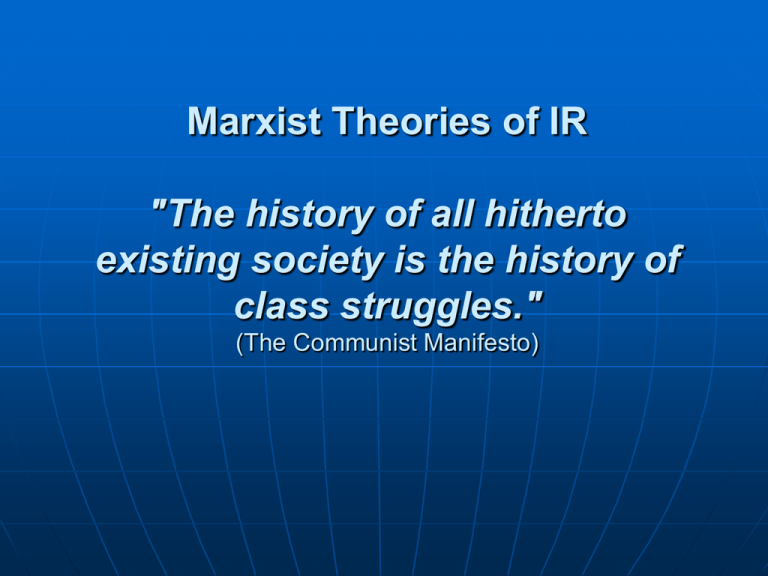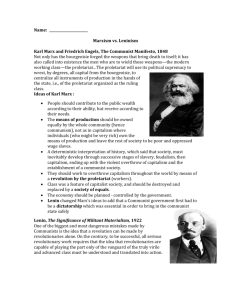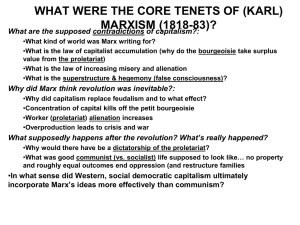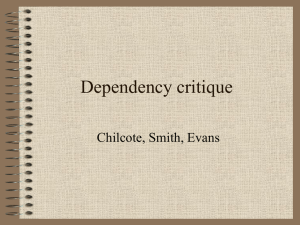Marxist Theories of IR
advertisement

Marxist Theories of IR "The history of all hitherto existing society is the history of class struggles." (The Communist Manifesto) Introduction Key figures: Marx, Engels and Lenin Key concepts of Marxism for IR Influence of Marxism on IR Critiques of Marxism Is Marxism obsolete? Conclusion Karl Marx (1818-1883) Family: German Protestant Jews Lawyer, journalist, doctorate on Greek political thought Young Hegelian The Communist Manifesto with Engels in 1848 – coinciding with 1848 revolutions across Europe Refuge in Paris, then London Led First International (working man’s association) See Francis Wheen’s biography Friedrich Engels (1820-1895). Son of German industrialist Managed father’s cotton factory in England Long political collaboration with Marx Key works: The Condition of the Working Class in England The Origin of the Family, Private Property and the State Marx’s philosophy Key influences: • Hegelian idealism – dialectical thinking • Feuerbach’s materialism • Criticises one-sideness of both idealism and materialism • His historical materialist approach attempted to overcome the one-sideness of both idealism and materialism • Key to overcoming one-sidedness of idealism and materialism by testing ideas in ‘revolutionary or practical-critical activity’ i.e .political and social experiment Marx’s critiques of Idealism and Materialism Works exploring Marx’s critiques of idealism and materialism and attempts to overcome dualism of base v superstructure etc e.g. Franz Jakubowski’s Ideology and Superstructure in Historical Materialism, Pluto, 1990 ‘the man who knows reality no longer stands outside history like Hegel’s “philosopher” but is himself a factor in transforming social relations. Theory no longer merely exists post-festum but becomes a lever in the revolutionary process.’ Consciousness and Being ‘It is not the consciousness of men that determines their existence, but their social existence that determines their consciousness.’ Marx, 1856 Preface to “The Critique of Political Economy” What does Marx mean? Aristotle on humans as social beings by nature Modern theories on the development of human consciousness Link to tool use see e.g. Voloshinov’s linguistic theories see e.g. Raymond Tallis’ The Hand History making subjects Historical/dialectical materialism Human agency in human-made material conditions ‘Men make their own history, but they do not make it just as they please, they do not make it under circumstances chosen by themselves, but under circumstances directly encountered, given and transmitted from the past’ Marx, Brumaire ‘man’s consciousness not only reflects the objective world but creates it’ Lenin, Philosophical Notebooks Marx’s Theory of Alienation Marx’s Theory of Alienation “whom am I now to believe, political economy or ethics? ... It stems from the very nature of estrangement that each sphere applies to me a different and opposite yardstick – ethics one and political economy another; for each is a specific estrangement of man and focuses attention on a particular field of estranged essential activity, and each stands in an estranged relation to the other.” Human Needs & the Division of Labour, Marx 1844 See Istvan Mezaros’ Marx’s Theory of Alienation , Merlin Books, 1970 http://www.marxists.org/archive/me szaros/works/alien/index.htm Dialectical approach • • • • • From Hegel’s dialectics Dialectics as understanding of social relations in motion e.g. value only value if in motion Dialectical historical development: thesis, antithesis, synthesis Contradictory forces and relations under capitalism – social production v private appropriation of profit – socialising v alienating aspects of capitalism Contradictory character of capitalist commodity production Commodities as use values v exchange values Commodification – everything becomes a commodity including human life Products may be socially wanted but particular social groups in need may not be able to buy them E.g. famine politics housing problems E.g. Contradictory character of capitalist production Social production i.e. groups of workers producing things for others not for themselves Private appropriation – profits going to owners of factories not to factory workers Contradictory character of money • gold as money form • Particular commodity v universal value in exchange • Capitalism as value in motion • Money form (currency, credit etc) easing circulation • operation of market not the same as barter economy • every sale does not necessarily lead to purchase new purchase • potential hiatus in circulation • E.g. current credit crunch Vladimir Lenin (1870-1924) Key figure in 1917 Russian Revolution Leader of Bolshevik Party Key works: Imperialism: The Highest Stage of Capitalism State and Revolution What is to be done? Lenin- Imperialism: Highest Stage of Capitalism Imperialism = monopoly stage of capitalism Concentration of production & creation of monopolies Contradictions of monopoly v free trade Dominance of finance capital Export of capital not just goods Different from earlier empires and even earlier European colonial rule Lenin- Imperialism: Highest Stage of Capitalism Lenin quotes Cecil Rhodes in 1895: ‘The Empire…is a bread-and butter question. If you want to avoid civil war, you must become imperialists.’ John Hobson’s Imperialism, A Study, 1902 Lenin’s work drawing upon Hobson’s work Large extracts in Lenin’s Imperialism Fate of Lenin’s Imperialism ‘imperialism’ became a generic term with little content….the category imperialism was extended to cover almost any relationship of subordination or control. Today, Lenin’s ‘grounding of imperialism in issues of the boardroom has been almost entirely forgotten’ (Lewis and Malone in Lenin, 1996, p. xiii). Common criticisms of Marxism • • • • • • • utopian ignores conventional struggles for power and security arising in anarchical system (Ken Waltz) economic determinism (Martin Wight) over-estimation of class political struggle working class not revolutionary underestimated nationalism criticisms underscored by Marxist concepts becoming rigid Responses to criticisms Economic determinism? Various Marxist strands downplay dialectics and suggest causal determinism But dialectical method - understanding relations as in motion, involving contradictory relations and forces not simple static, causal determinism Equating theoretical approach with results of approach at particular historical moment ‘Most criticisms merely state the obvious – that the world is not the same as when [they] wrote’ (Lewis and Malone in Lenin, 1996, p. xiii). Marxism’s influence on International Relations theories Influence on International Political Economy and development theories Modernisation theory as response to Marxism Dependency or Underdevelopment theories • Rostow’s Stages of Economic Growth: A Non-Communist Manifesto, 1960 • Andre Gunder Frank, Samir Amin, Raul Prebisch Gramsci and Neo-Gramcian theories World-systems theories • Immanual Wallerstein Post-colonial theories e.g. Edward Said’s Orientalism, Culture and Imperialism, Hardt and Negri’s Empire Continuing influence on critical theories e.g. concepts of agency, emancipation etc Dependency or underdevelopment theories Key theorists: Andre Gunder Frank, Samir Amin, Raul Prebisch Formal political control (colonialism) not necessary to create dependency, possible through economic means Uneven development and underdevelopment Capitalism leading to uneven development and hindering development of developing countries Not opposed to industrialisation But entanglement of industrial sectors with foreign capital relations Seek strategies to develop independent national economies free from international capitalist political economy. Relevance of Marxist theories today? Relevance of Marxist theories of class struggle, capitalism, imperialism, militarism to international politics today? How do we understand humanitarian intervention? e.g. Bosnia, Kosovo How do we understand global governance? e.g. Bosnia, Kosovo – economic drain rather than economic extraction Why invade Iraq if could better dominate a country and extract more profit with formally independent state without costs of occupation? Responses Dialectic understanding of social relations v Marx’s particular analysis of social relations under capitalism in particular period Dialectic analysis of social relations in motion will not be same as Marx’s analysis of 150 years ago E.g. Marx’s analysis of idealism in German Ideology perhaps more relevant than Capital in explaining today’s international humanitarian interventions. Further reading and resources • E.g. communist manifesto in cartoon version that I told you about: http://uk.youtube.com/watch?v=znMkqEnO6d4 E.g. Reading Marx’s Capital with David Harvey 13 2-hour podcast lectures http://davidharvey.org/







